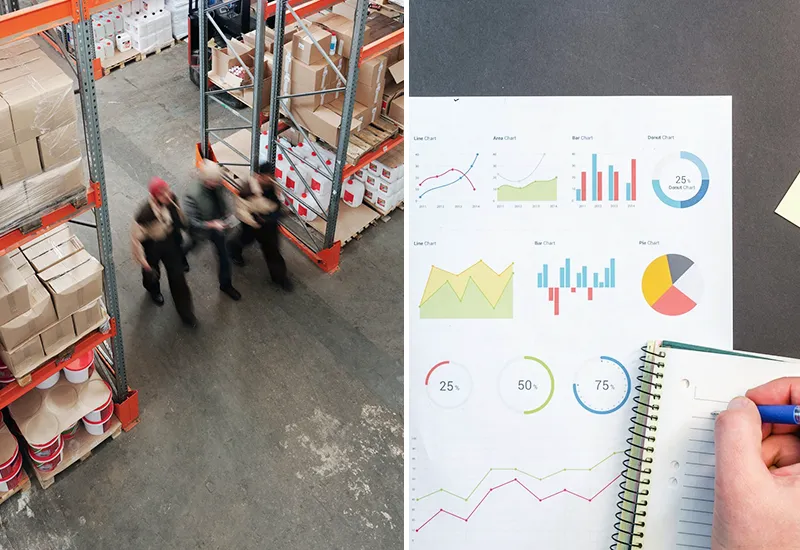Do you want to learn about typical myths in sustainability consulting? Dann bist du hier genau richtig! Zu teuer, zu kompliziert, zu unbedeutend – es gibt überraschend viele Vorurteile gegenüber nachhaltigem Handeln in Unternehmen, die sich hartnäckig halten.
Doch in der Realität kann die Beratung in puncto Sustainability das genaue Gegenteil davon sein: nämlich kosteneffizient, simpel und erfolgversprechend – und zwar für alle Unternehmen jeder Größe und Branche.
In diesem Artikel möchte ich deshalb jetzt mit klassischen Missverständnissen und Mythen der Umwelt- und Nachhaltigkeitsberatung aufräumen und sie der Reihe nach entkräften. Auf geht's!
Good to know: About General sustainability myths habe ich noch einen separaten Artikel zusammengestellt, falls es dich interessiert. Hier soll es jetzt aber speziell um die Vorurteile gegenüber Nachhaltigkeitsberater:innen gehen.
Myth 1: "Sustainability consulting is always the same anyway!"

The idea that all sustainability consultancies are in principle immer dieselben, standardisierten Tools, Maßnahmen und Lösungen anbieten, ist weit gefehlt. Da sie sich leider hartnäckig hält, bringt sie auch viele Betriebe zu der Einschätzung, keine Unterstützung zu brauchen.
Since every company has its own individual structures, goals and challenges, werden professionelle Umweltberater:innen aber natürlich stets auf den jeweiligen Betrieb maßgeschneidert beraten. Der Irrtum, dass sie nur in unflexiblen Einheitsgrößen denken und handeln, gehört also in die Welt der Mythen.
2. Mythos: „Nachhaltigkeitsberatung ist nur etwas für die ganz großen Konzerne.“
Tatsächlich denken viele kleine oder mittelständische Unternehmer:innen, dass nur Megakonzerne Nachhaltigkeitsbeauftragte bzw. eine Nachhaltigkeitsberatung benötigen würden, da sie strict guidelines and the Erwartungen ihrer Interessen- oder Anspruchsgruppen erfüllen müssen. Dieser Mythos hält die Betriebe in der Folge oft davon ab, sich nachhaltig zu entwickeln.
Doch in der alltäglichen Praxis unterstützen Sustainability consultants Unternehmen jeder Größe dabei, ihre Prozesse zu optimieren, Ressourcen effizienter zu nutzen und so ihre Wettbewerbsfähigkeit zu stärken.
There are even especially the young startups und kleinen Unternehmen, die von der Beratung profitieren, weil sich etwaige Anpassungen und Lösungen dort viel schneller umsetzen lassen.
Heutige Gründer:innen haben außerdem einen höheren Anspruch an den ökologischen, sozialen und ethischen Sinn ihrer Geschäftsmodelle, weshalb sie sich immer häufiger auch schon in der Gründungsphase für eine Umweltberatung entscheiden.
Tip: Like sustainable foundation funktionieren kann, erläutere ich dir übrigens in einem separaten Blogartikel.
Myth 3: "Anyone can communicate sustainable progress, it's all greenwashing anyway!"
Another myth of sustainability consulting is that it is usually about Greenwashing (i.e. only one vorgetäuschte Nachhaltigkeit) handelt, wenn Unternehmen ihre ökologischen und sozialen Fortschritte per Pressemitteilung oder Nachhaltigkeitsbericht veröffentlichen.
Dieser fälschliche Eindruck ist sicherlich darauf zurückzuführen, dass der Begriff „nachhaltig“ nicht geschützt is. And presumably also to the fact that some entrepreneurs consciously and brazenly more sustainable than they are.
But es ist ja gerade diese Transparenz in der Öffentlichkeitsarbeit, die ein Unternehmen authentischer macht und Vertrauen schafft. Schlussendlich ist es weder scheinheilig noch hochnäsig, sondern für andere Unternehmen und Menschen inspirierend, wenn ein Betrieb offen und ehrlich eine nachhaltige Vision verfolgt und Teilerfolge veröffentlicht. Nachhaltigkeitsberater:innen stehen dabei mit Rat und Tat zur Seite.
Good to know: The companies that, due to such prejudices, for example Climate protection in the company verschließen, werden sich schlussendlich (u.a. durch Wettbewerbsnachteile) selbst schaden.
4. "Sustainability consulting is far too expensive and hampers corporate success."
A typical misconception surrounding greater sustainability in companies is that the finanzielle Aufwand für konkrete Maßnahmen sehr hoch und der Effekt für den wirtschaftlichen Ertrag des Unternehmens extrem niedrig sei. Doch bei genauerer Betrachtung ist die Umweltberatung nicht teuer – What is more expensive is not acting.
Denn schlussendlich ist die Unterstützung durch Nachhaltigkeitsbeauftragte oder -berater:innen eine (einmalige oder begleitende) sinnvolle Investition, die unter anderem Competitive advantages (z.B. bei umweltbewussten Kund:innen oder Bewerber:innen) schafft und somit den Unternehmensgewinn erhöht.
Außerdem sollte jedem bewusst sein, dass sich Save costs through sustainable action let. For example, by using the Abfallproduktion und der firmeneigene CO2-Ausstoß minimiert or the Energieeffizienz erhöht will.
Die zukunftsorientierte Ausrichtung und die Vorbereitung auf sozial- oder umweltbezogene Gesetzesänderungen mindern außerdem das Risiko eines Betriebs für unerwartete Bußgelder oder schwerwiegende Imageschäden, die wiederum mindestens erhebliche Umsatzeinbußen zufolge hätten.
Good to know: Auch Betriebe mit kleinen Budgets können sich grundsätzlich eine Nachhaltigkeitsberatung leisten, da die Umweltexpert:innen jedes Unternehmen nach seinen individuellen Gegebenheiten und Möglichkeiten beraten.
Myth 5: "Sustainability consulting is all about the environment."

Ein weit verbreitetes Vorurteil gegenüber der Nachhaltigkeitsberatung ist außerdem, dass sie sich ausschließlich auf ökologische und not on economic or social aspects within a company refers to.
Doch in der Realität wird nach dem Three-pillar model (bzw. dem sogenannten Triple-Bottom-Line-Ansatz) vorgegangen und beraten. Es findet also eine ganzheitliche Betrachtung statt, bei der sowohl die ökologische, als auch die soziale und wirtschaftliche Nachhaltigkeit gefördert wird.
Good sustainability consultants will find a healthy balanceThis means that the long-term success of the company is definitely not in danger, but rather increasingly likely.
6. myth: "Sustainability consulting is just a short-lived trend anyway."
Dass es sich bei der angestrebten, gesellschaftlichen oder ökonomischen Nachhaltigkeit nur an entertaining fad handle, ist ein weiterer Irrtum, der schlussendlich sogar ökonomisch existenzbedrohend sein kann.
Bedrohlich sind auch die Gründe, warum Nachhaltigkeit kein Trend ist. Ein paar Stichworte gefällig? climate change, Rainforest deforestation, Plastic waste in the environment, planetary boundaries, Climate tipping points. Wir Menschen haben uns durch unser Verhalten auf diesem Planeten selbst in große Gefahr gebracht – und müssen etwas ändern.
Ein ökologischer Wandel ist unausweichlich, um unsere und auch zukünftige Generationen zu schützen. Und dass wird auch immer mehr Investor:innen, Politiker:innen, Verbraucher:innen und nicht zuletzt auch guten Unternehmer:innen bewusst.
Neben den ökologischen Faktoren werden aber auch die social aspects immer relevanter für sie. Ethisches und transparentes Handeln, die Wahrung von Menschenrechten in der Lieferkette, Arbeitssicherheit und fairer Handel zum Beispiel.
Sustainable management is therefore not a fading trend, but rather a neue Art, erfolgreich Geschäfte zu machenwithout forgetting the environment and social interaction.
7. Mythos: „Es ist ausreichend, eine für Nachhaltigkeit verantwortliche Person zu bestimmen.“
Natürlich ist es ein guter Anfang, im eigenen Unternehmen eine:n Nachhaltigkeitsbeauftragte:n oder einen Chief Sustainability Officer auszuwählen – oder sogar eine komplette neue „Abteilung Nachhaltigkeit“ zu gründen.
However, the long-term, sustainable development of a company cannot be achieved by 1-2 people. Rather it requires the participation and commitment of all employees. (und eine Art WIR-Gefühl)
Dafür muss eine Verbindung zwischen den ökologischen und sozialen Zielen und dem operativen, alltäglichen Geschäft geschaffen werden. Und dass funktioniert, indem sustainability into the company's philosophy, also sozusagen in dessen DNA, übergeht. Nur so ist es möglich, den selbst gesteckten Zielen näher zu kommen und der nachhaltigen Entwicklung nicht immer wieder andere Zielsetzungen und Maßnahmen vorzuziehen.
Tip: Ideen dafür, wie du deine Motivating colleagues to be more sustainable in the linked article. Have a look!
8. Mythos: „Nachhaltige Maßnahmen sind schwer messbar und vergleichbar.“
Mit der angeblich erschwerten Messbarkeit und Vergleichbarkeit steht uns ein weiterer, weit verbreiteter Mythos der Nachhaltigkeitsberatung gegenüber. In der Praxis sieht es nämlich ganz anders aus: Mit den richtigen Werkzeugen, Konzepten und Fachkenntnissen können Nachhaltigkeitsberater:innen nämlich Clear KPIs (Key Performance Indicators) and make progress measurable.
Hier haben ich dir einige Beispiele für mögliche ökologische und soziale KPIs compiled:
Ökologisch relevante KPIs
- Water consumption (including waste water volume)
- Energy consumption (e.g. absolute or per product manufactured)
- CO2 emissions
- Amount of waste
- Material consumption (or proportion of recycled materials)
Socially relevant KPIs
- Employee satisfaction
- Investments in further education and training or social commitment
- Männer-Frauen-Anteil im Team
- Labor and social standards at suppliers
Such indicators ultimately make it möglich, den Erfolg konkreter, durchgeführter Maßnahmen zu überwachen und diese gegebenenfalls zu optimieren. Die nachhaltige Entwicklung im eigenen Unternehmen ist also messbar – sie erfordert aber die Zusammenarbeit aller Abteilungen.
9. Mythos: „Nachhaltigkeitsberatung ist nur sinnvoll für Unternehmen, die Produkte herstellen.“
Produzierende Gewerbe verbrauchen über ihre Lieferketten und vor allem beim Herstellungsprozess erfahrungsgemäß große Mengen natural resources. For example Energy, water or wood.
Doch es ist ein typischer Mythos der Nachhaltigkeitsberatung, dass nur diese Unternehmen nachhaltiger Handeln können. Auch Dienstleistungsunternehmen, Handelsfirmen und sogar Non-Profit-Organisationen haben ökologische und soziale Potenziale, die darauf warten ausgeschöpft zu werden. Zum Beispiel beim Papierverbrauch im Büro, beim CO2-Ausstoß der Fahrten im Außendienst oder bei Lieferungen.
Schlussendlich kann also jedes Unternehmen – unabhängig vom Produktionskontext oder der Branche – von einer Nachhaltigkeitsberatung profitieren.
Myth 10: "It's enough to produce a sustainability report."

Unternehmer:innen, die dieses Vorurteil für wahr halten, werden die Nachhaltigkeit in ihrem Betrieb not at all or much too slowly. Denn ein Nachhaltigkeitsbericht schafft zwar Transparenz und informiert über ihre nachhaltigen Bemühungen – schlussendlich kommen sie mit der Erstellung aber erst einmal nur ihrer Rechenschaftspflicht nach.
Diese Maßnahme ist aber natürlich immer noch keine Garantie für ökologische und soziale Fortschritte. Dafür braucht es klare Maßnahmen, wie die Erarbeitung von Vision, Mission und Leitbild oder zielgerichtete Schulungen der Mitarbeiter:innen. Solche Maßnahmen müssen geplant, im Unternehmensalltag umgesetzt und regelmäßig kontrolliert und optimiert werden.
Nachhaltigkeitsberatung lohnt sich für alle!
Every company needs sustainability consultants in order to move safely and successfully into the future. The investment and adaptation pays off in the end sowohl für das Unternehmen, als auch für die Umwelt und unsere Gesellschaft. Sustainability consultants not only try to prevent negative effects, but also to have a positive impact.
Hier und heute habe ich dir einige der hartnäckigsten Mythen, Vorurteile und Halbwahrheiten über die Nachhaltigkeitsberatung zusammengestellt und mit einigen Missverständnissen und Irrtümern aufgeräumt. Ich denke, dass klar geworden ist, dass Nachhaltigkeit auch aus unternehmerischer Sicht eine große Chance and does not represent a burden.
"The purest form of insanity is to leave everything as it is and hope that something will change."
Albert Einstein (more under Sustainability Quotes)
Hast du Fragen, Anregungen, weitere Mythen oder eigene Erfahrungen mit der Nachhaltigkeit in Unternehmen gemacht, die du teilen möchtest? Dann freue ich mich auf deinen Kommentar.
Bleib‘ offen und nachhaltig,

PS: Also Sustainable investing kann für Unternehmer:innen eine großartige Gelegenheit sein, den ökonomischen Erfolg zu steigern und gleichzeitig Umwelt und Gesellschaft zu fördern. Wie das funktioniert und welche Vorteile die grüne Geldanlage birgt, erläutere ich dir jetzt in den verlinkten Beiträgen.








